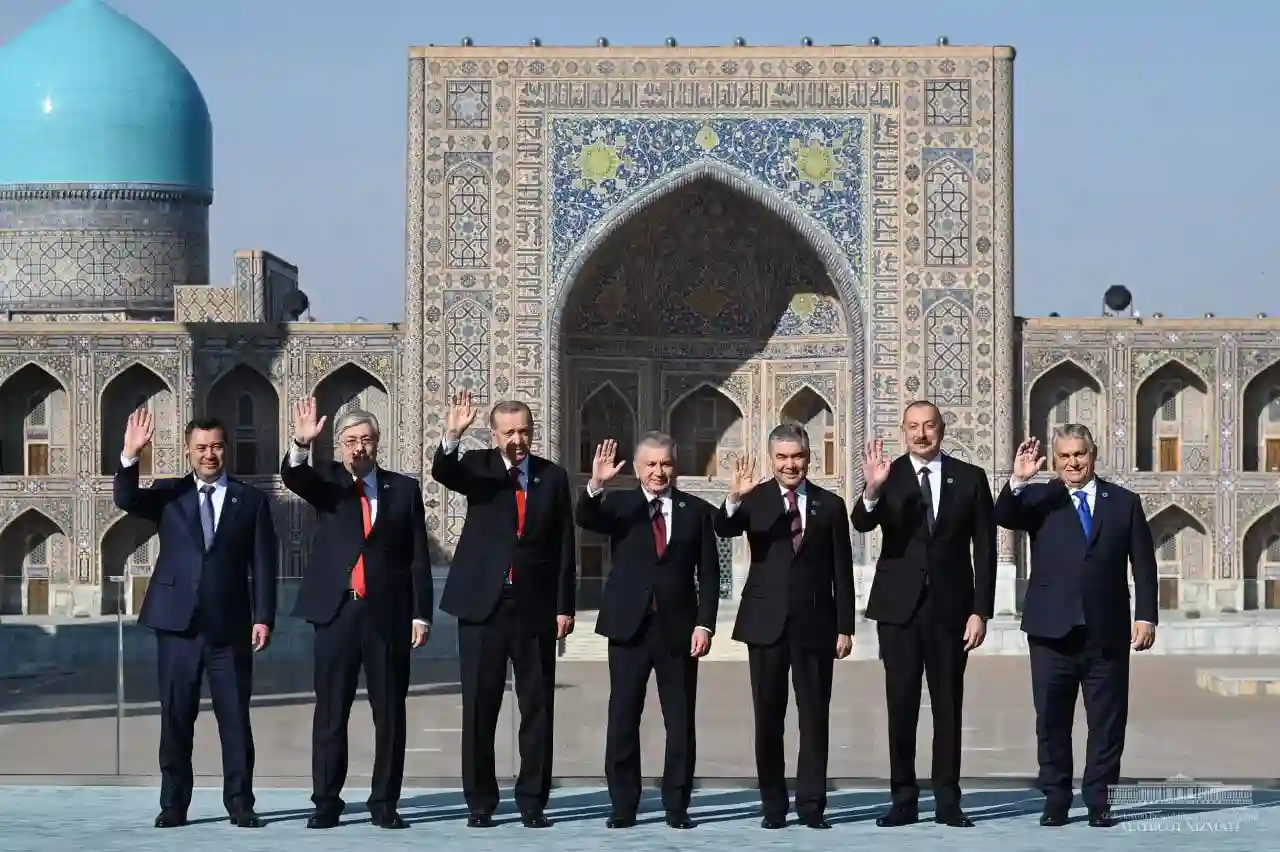Going by social media posts in the Turkic world, one would think that the map of Eurasia had changed overnight and instead of the numerous countries now dotting it, a huge unified entity had emerged–Turan. This is fantasy of course, but a barometer of how potent and alive the dream of pan-Turkism is. And it is one that is slowly coming to reality, albeit in a unity in diversity kind of way.
Last week in the historic and beautiful Uzbek city of Samarkand, the Organisation of Turkic States held its first summit meeting with the heads of members states–President Ilham Aliyev of Azerbaijan, President Kassym-Jomart Tokayev of Kazakhstan, President Sadyr Japarov of Kyrgyzstan, President Reccep Tayib Erdogan of Turkey, and Uzbekistan’s President Shavkat Mirziyoyev attending the summit. Also in attendance were Gurbanguly Berdemokhamed, the Chairman of the People’s Council of Turkmenistan–an observer State and Prime Minister Viktor Orban of Hungary, another observer State.
During @Turkic_States meeting yesterday, #Kazakhstan
President called for “territorial integrity of all states”
and “strict observance of the #UN Charter”.
It was a supportive reference to #Ukraine
and territorial independence

pic.twitter.com/nRqcthIwvg
— Samuel Doveri Vesterbye (@SamuelJsdv) November 12, 2022
What had been the brain child of former Kazakh president Nur Sultan Nazarbayev is increasingly coming on its own. The organization is not a new one. Its founding members–Turkey, Kazakhstan, Kyrgyzstan, and Azerbaijan have been meeting regularly since 1996, soon after the breakup of the Soviet Union and the emergence of five Turkic states on its territory till the meetings became institutionalised as the Turkic Council with the signing of the Nakhichivan Agreement in 2009. Representing 2.15 per cent of the world’s population and one per cent of the world’s territory, it was joined by fellow Turkic state of Uzbekistan in 2019. It is dedicated to fostering greater cooperation and integration between Turkic-speaking countries. Turkmenistan is the only Turkic country that is currently an observer with the organization, as is Hungary whose president Viktor Orbán supports the theory that Hungarians descended from Turkic-speaking Kipchaks.
At the heart of the organization lies economic calculations and connectivity. While the former Soviet republics have been looking to forge regional collaborations and cooperation for stability, security, and economic gains, Turkey’s ambitions have been to expand influence in the post-Soviet space. A common cultural and linguistic heritage has become a lynchpin for such cooperation.
A watershed moment in the council’s history was Azerbaijan’s victory over neighbouring Armenia in the war over Nagorno-Karabakh in 2020. Amply aided by Turkey, Azerbaijan emerged victorious after two decades of its conflict with Armenia. It was viewed as a moment of grand Turkic solidarity and cooperation, and a collaboration that was worth being replicated by others. Turkey emerged another winner, winning contracts for defence hardware from other fellow Turkic members who had closely watched the trajectory of the Karabakh war. Nazarbayev, who also participated in the meeting, though no longer president, had claimed that Azerbaijan’s victory in the “Patriotic War” was important both for the whole region and the Turkic World.
“The consequences of the support provided to Azerbaijan during the Karabakh War strengthened the Turkic world and caused an enormous advantage,” wrote Baghdad Amreyev, then Secretary General of Turkic Council, in an Op-ed for the Turkish Hurriyet. It definitely breathed new life in the organization which till then had been more rhetoric than action. But now the case for forging greater Turkic ties had been made. At the 2021 meeting in Turkey, the organization took another step forward when it renamed itself Organisation of Turkic States.
Azernaijan’s victory paved the way for the participation of the Turkish Cypriots as observer in the summit this year. “The Turkish Republic of Northern Cyprus has been accepted as an observer member to the Organization of the Turkic States. We will stand with the TRNC everywhere and every time,” Turkish Foreign Minister Mevlüt Çavuşoğlu announced on Twitter during the summit. Currently Turkey is the only country that recognizes the “Turkish Republic of Northern Cyprus”.
If last year it was the Azeri victory, then this year cooperation has been accelerated by the Russian-Ukraine conflict as the Central Asian States look towards alternative options, given Russia’s preoccupation with the war, and the slowing down of the Moscow led-Eurasian security and economic blocs–the Collective Security Treaty Organisation (CSTO), and the Eurasian Economic Cooperation (EEC). Added to that has been the prickly issue of territorial integrity that States like Kazakhstan are focusing on. President Kassym Jomart Tokayev made it a point to include this in his address at the summit.
For Kazakhstan, which shares a long common border with Russia and has a sizeable ethnic Russian population, the prospect of a similar Russian intervention is not impossible. While for Uzbekistan, as for Azerbaijan and Turkey, the interest is more in connectivity, and transport corridors connecting Kazakhstan in the east to the Mediterranean Sea via the Caspian Sea, Azerbaijan, and Turkey. With Western sanctions on Russia, the need for alternate routes without crossing Russian territory assumes far greater significance now. Yet another notable step is the formation of the “Turkic Investment Fund,” which will be created with the equal capital contribution of the member states, and formation of a special economic zone TURANSEZ.
The bloc can be a formidable one. It has all the potential to emerge a powerful bloc especially if Russia substantially weakens economically. India should be watching carefully. It has excellent relations with three of the member states–Kazakhstan, Kyrgyzstan, Uzbekistan, while its ties with Turkey and Azerbaijan are strained. Close defence cooperation between Turkey and States friendly to India may upset the balance. This remains to be seen. On the other hand, pan-Turkism can act as the antidote to pan-Islamism which Turkey in recent times has been keen on exporting and promoting.
Also Read: Is Baku’s belligerence paving the way for India-Iran-Armenia cooperation?

























